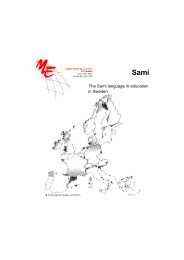Multilingual Early Language Transmission (MELT) - Mercator ...
Multilingual Early Language Transmission (MELT) - Mercator ...
Multilingual Early Language Transmission (MELT) - Mercator ...
You also want an ePaper? Increase the reach of your titles
YUMPU automatically turns print PDFs into web optimized ePapers that Google loves.
2. Information on best practices in the four regions<br />
This chapter concerns background information on pre-school education in four regions:<br />
Fryslân in the Netherlands, the Swedish community in Finland, Wales in UK and Brittany in<br />
France. This chapter presents the figure ‘Start of pre-, primary and compulsory school in the<br />
four <strong>MELT</strong> regions.’ Chapter 2.1 presents the general <strong>MELT</strong> definition of ‘pre-school.’ The<br />
different types of pre-school provisions in the regions are further clarified and the<br />
differences and similarities in the regions are described in chapter 2.2 to 2.5. These chapters<br />
include numbers, descriptions and information regarding the four regions from different<br />
websites. Most information is obtained from the NPLD pre-school project 9 and the Regional<br />
dossier series. 10 Chapter 2.6 shows a summary of practices and approaches, which according<br />
to the <strong>MELT</strong> partners are best to promote the minority language in pre-school education.<br />
Figure 2.1 below presents an overview of the infrastructure of provisions for early childhood<br />
education in the four regions, structured for ages of participation. Parents decide on<br />
voluntary basis whether or not their children receive pre-primary school education.<br />
Sometimes parents choose consciously for their children to attend pre-school provisions for<br />
social or educational reasons, and sometimes parents just decide for practical reasons: their<br />
children attend a nursery provision while they are both working.<br />
The model distinguishes ‘day care’ and ‘playgroups.’ In this paper ‘day care’ is used as the<br />
general terminology for centres like nurseries, crèches, babysitters, childminders etc. These<br />
provisions focus on the care of children. Usually no didactic curriculum is used. The<br />
terminology ‘playgroup’ on the contrary is used for any playgroup settings, such as<br />
kindergarten or pre-school classes based on a focused curriculum. In playgroups<br />
practitioners use a didactic curriculum and mostly they are called and considered ‘teacher’<br />
by children and parents.<br />
The figure below also presents the start of primary school and the age of compulsory school<br />
in the four regions. This model is only an indication, there are exceptions to the rule; some<br />
municipalities give advice or expect parents to bring their children to a certain pre-school<br />
provision and some day care centres use a curriculum. 11<br />
9<br />
The Network to Promote Linguistic Diversity (NPLD) is an European network which encompasses constitutional, regional and smallerstate<br />
languages to promote linguistic diversity in the context of a multilingual Europe. The questionnaires from the project ‘Pre-School<br />
Education’ (2010) http://www.npld.eu/currentprojectsbestpractise/pre-schooled/pages/default.aspx [Accessed August 2011].<br />
10<br />
Regional dossier series. <strong>Mercator</strong> European Research Centre on <strong>Multilingual</strong>ism and <strong>Language</strong> Learning, http://www.mercatorresearch.eu/research-projects/regional-dossiers<br />
[Accessed August 2011].<br />
11<br />
An overview of ages starting compulsory school in European countries. The Eurydice Network; includes the Member States of the<br />
European Union http://www.nfer.ac.uk/nfer/index.cfm?9B1C0068-C29E-AD4D-0AEC-8B4F43F54A28 [Accessed August 2011].<br />
17



